How Entrepreneurial Skills Motivate Employees: Marks and Spencer
VerifiedAdded on 2023/01/07
|12
|3983
|61
Report
AI Summary
This report investigates the impact of entrepreneurial skills on employee motivation, focusing on Marks and Spencer as a case study. It defines entrepreneurial skills, such as innovation, risk-taking, and creativity, and explains their importance in various job roles. The research aims to analyze the impact of these skills on employee motivation, identify benefits of their development, and determine challenges faced by employees lacking these skills. The theoretical background highlights the connection between employee motivation and organizational success, emphasizing the role of training and development. The report discusses the benefits of skills like time management, strategic thinking, and networking, and the challenges associated with their absence, such as poor time management and lack of creativity. The research justifies its importance by addressing the need for employees to develop entrepreneurial skills for better performance and career advancement.
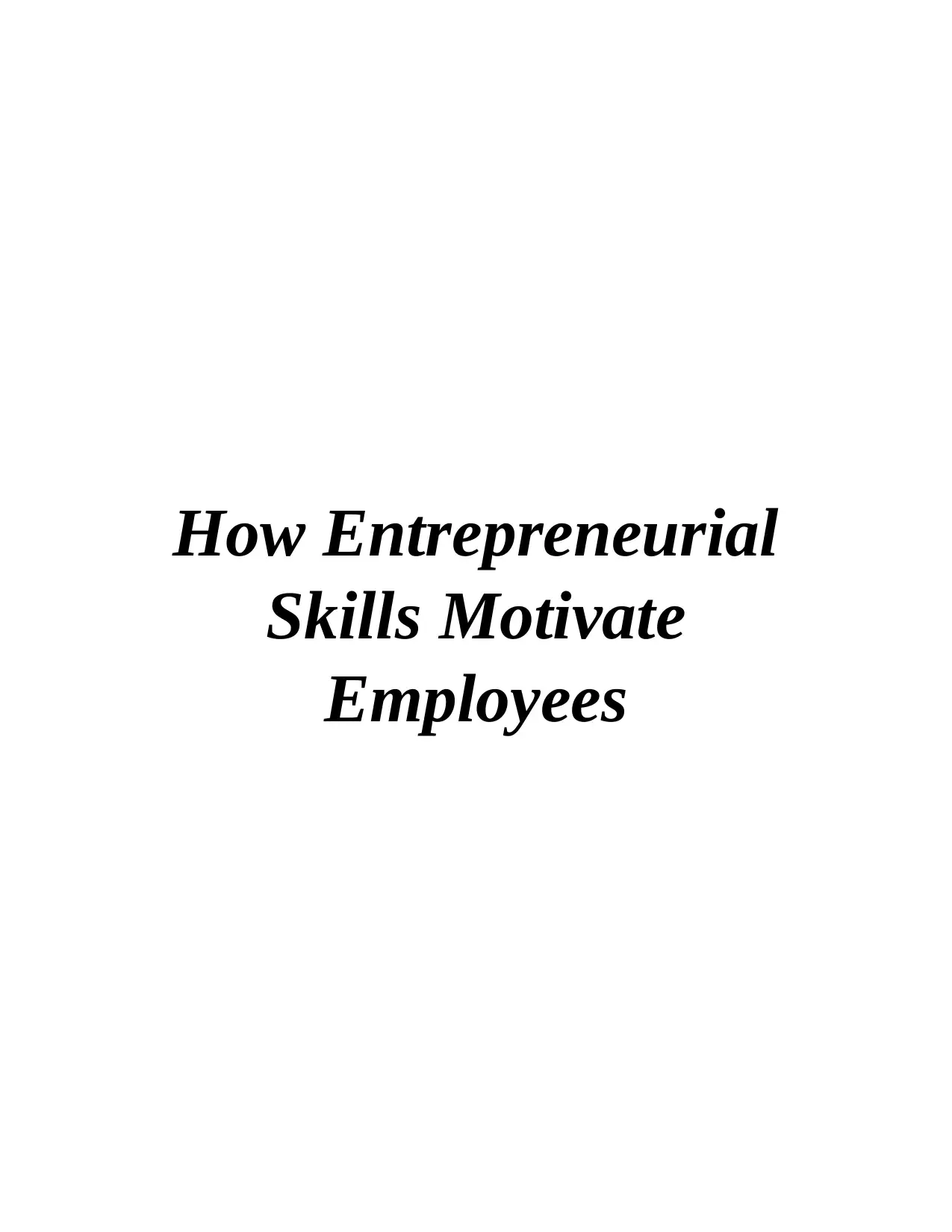
How Entrepreneurial
Skills Motivate
Employees
Skills Motivate
Employees
Paraphrase This Document
Need a fresh take? Get an instant paraphrase of this document with our AI Paraphraser
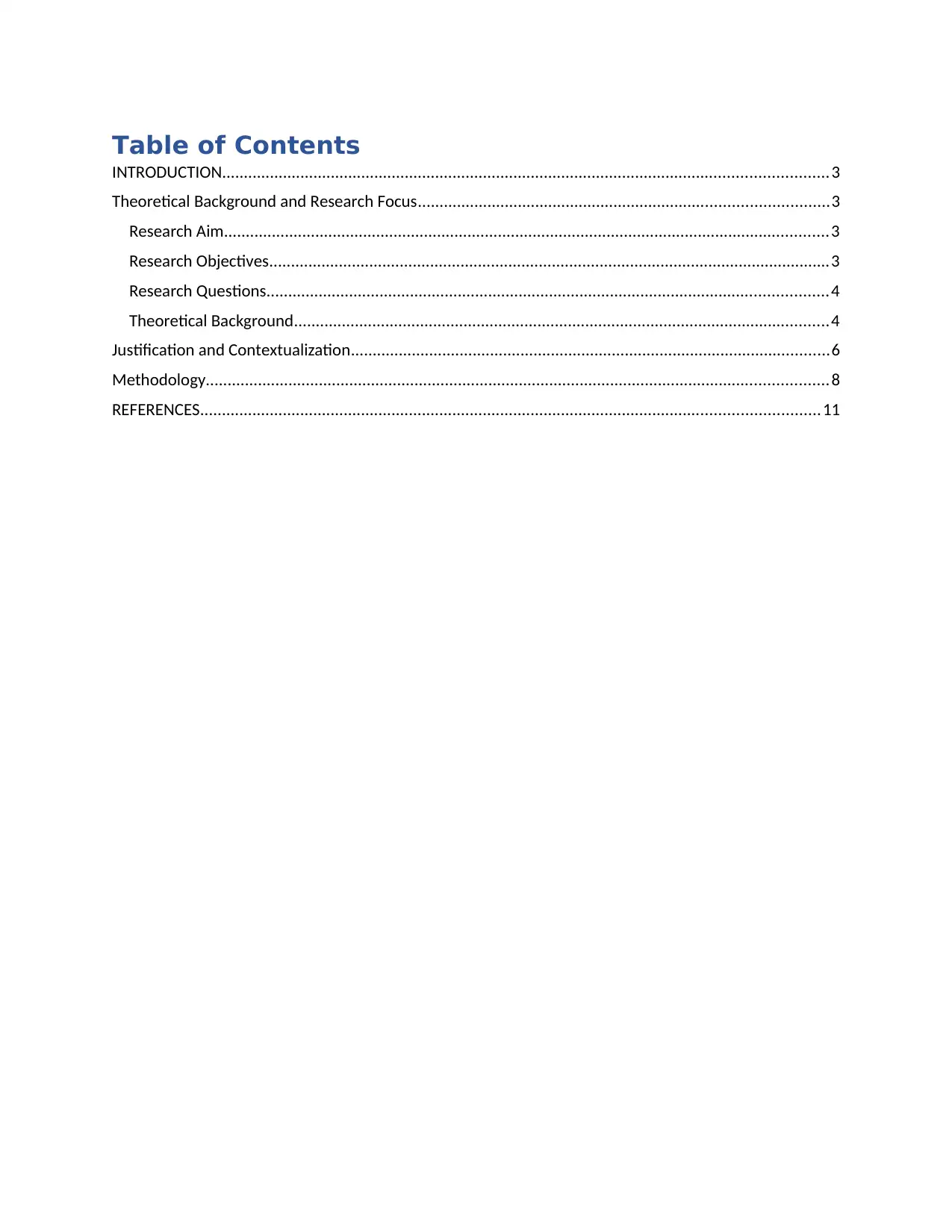
Table of Contents
INTRODUCTION...........................................................................................................................................3
Theoretical Background and Research Focus..............................................................................................3
Research Aim...........................................................................................................................................3
Research Objectives.................................................................................................................................3
Research Questions.................................................................................................................................4
Theoretical Background...........................................................................................................................4
Justification and Contextualization..............................................................................................................6
Methodology...............................................................................................................................................8
REFERENCES..............................................................................................................................................11
INTRODUCTION...........................................................................................................................................3
Theoretical Background and Research Focus..............................................................................................3
Research Aim...........................................................................................................................................3
Research Objectives.................................................................................................................................3
Research Questions.................................................................................................................................4
Theoretical Background...........................................................................................................................4
Justification and Contextualization..............................................................................................................6
Methodology...............................................................................................................................................8
REFERENCES..............................................................................................................................................11
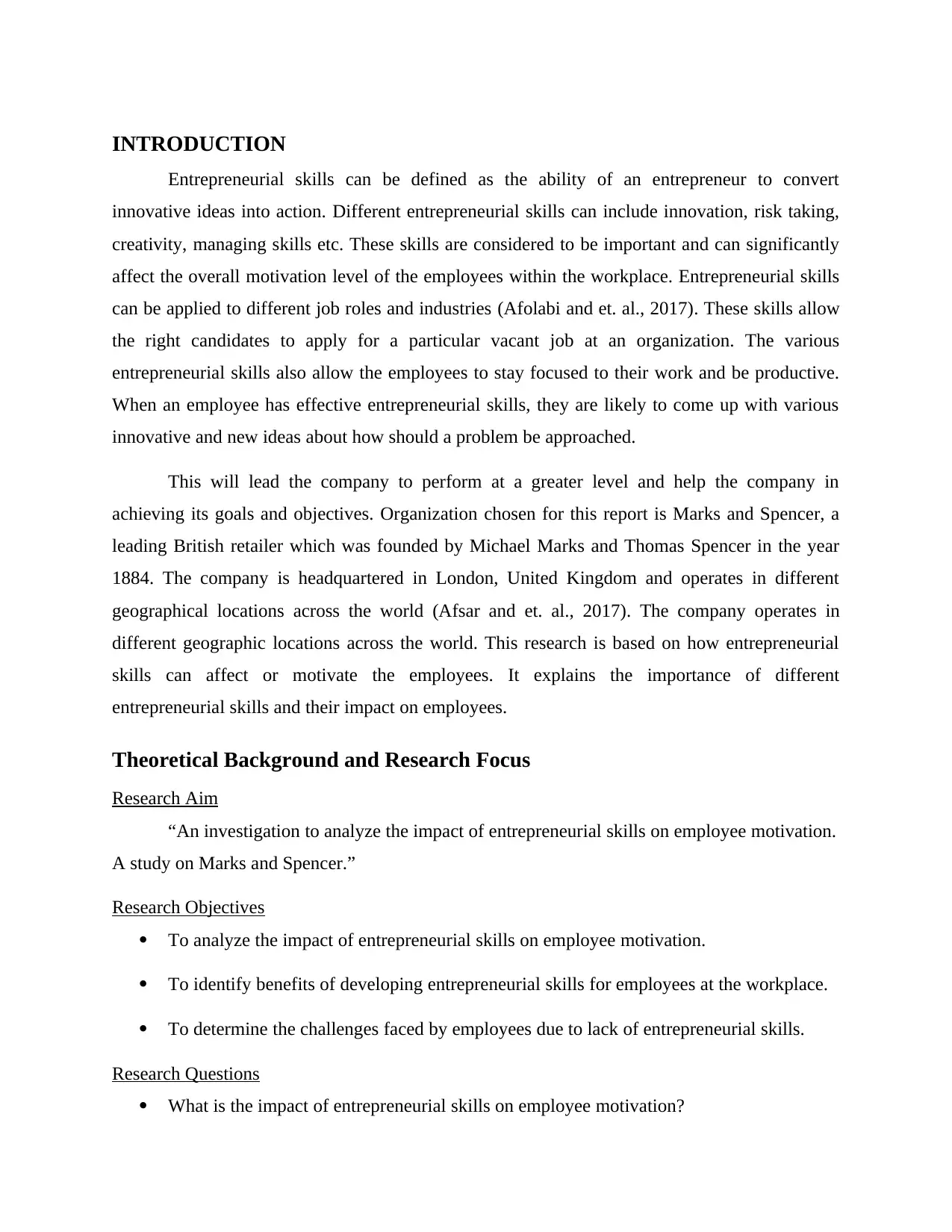
INTRODUCTION
Entrepreneurial skills can be defined as the ability of an entrepreneur to convert
innovative ideas into action. Different entrepreneurial skills can include innovation, risk taking,
creativity, managing skills etc. These skills are considered to be important and can significantly
affect the overall motivation level of the employees within the workplace. Entrepreneurial skills
can be applied to different job roles and industries (Afolabi and et. al., 2017). These skills allow
the right candidates to apply for a particular vacant job at an organization. The various
entrepreneurial skills also allow the employees to stay focused to their work and be productive.
When an employee has effective entrepreneurial skills, they are likely to come up with various
innovative and new ideas about how should a problem be approached.
This will lead the company to perform at a greater level and help the company in
achieving its goals and objectives. Organization chosen for this report is Marks and Spencer, a
leading British retailer which was founded by Michael Marks and Thomas Spencer in the year
1884. The company is headquartered in London, United Kingdom and operates in different
geographical locations across the world (Afsar and et. al., 2017). The company operates in
different geographic locations across the world. This research is based on how entrepreneurial
skills can affect or motivate the employees. It explains the importance of different
entrepreneurial skills and their impact on employees.
Theoretical Background and Research Focus
Research Aim
“An investigation to analyze the impact of entrepreneurial skills on employee motivation.
A study on Marks and Spencer.”
Research Objectives
To analyze the impact of entrepreneurial skills on employee motivation.
To identify benefits of developing entrepreneurial skills for employees at the workplace.
To determine the challenges faced by employees due to lack of entrepreneurial skills.
Research Questions
What is the impact of entrepreneurial skills on employee motivation?
Entrepreneurial skills can be defined as the ability of an entrepreneur to convert
innovative ideas into action. Different entrepreneurial skills can include innovation, risk taking,
creativity, managing skills etc. These skills are considered to be important and can significantly
affect the overall motivation level of the employees within the workplace. Entrepreneurial skills
can be applied to different job roles and industries (Afolabi and et. al., 2017). These skills allow
the right candidates to apply for a particular vacant job at an organization. The various
entrepreneurial skills also allow the employees to stay focused to their work and be productive.
When an employee has effective entrepreneurial skills, they are likely to come up with various
innovative and new ideas about how should a problem be approached.
This will lead the company to perform at a greater level and help the company in
achieving its goals and objectives. Organization chosen for this report is Marks and Spencer, a
leading British retailer which was founded by Michael Marks and Thomas Spencer in the year
1884. The company is headquartered in London, United Kingdom and operates in different
geographical locations across the world (Afsar and et. al., 2017). The company operates in
different geographic locations across the world. This research is based on how entrepreneurial
skills can affect or motivate the employees. It explains the importance of different
entrepreneurial skills and their impact on employees.
Theoretical Background and Research Focus
Research Aim
“An investigation to analyze the impact of entrepreneurial skills on employee motivation.
A study on Marks and Spencer.”
Research Objectives
To analyze the impact of entrepreneurial skills on employee motivation.
To identify benefits of developing entrepreneurial skills for employees at the workplace.
To determine the challenges faced by employees due to lack of entrepreneurial skills.
Research Questions
What is the impact of entrepreneurial skills on employee motivation?
⊘ This is a preview!⊘
Do you want full access?
Subscribe today to unlock all pages.

Trusted by 1+ million students worldwide
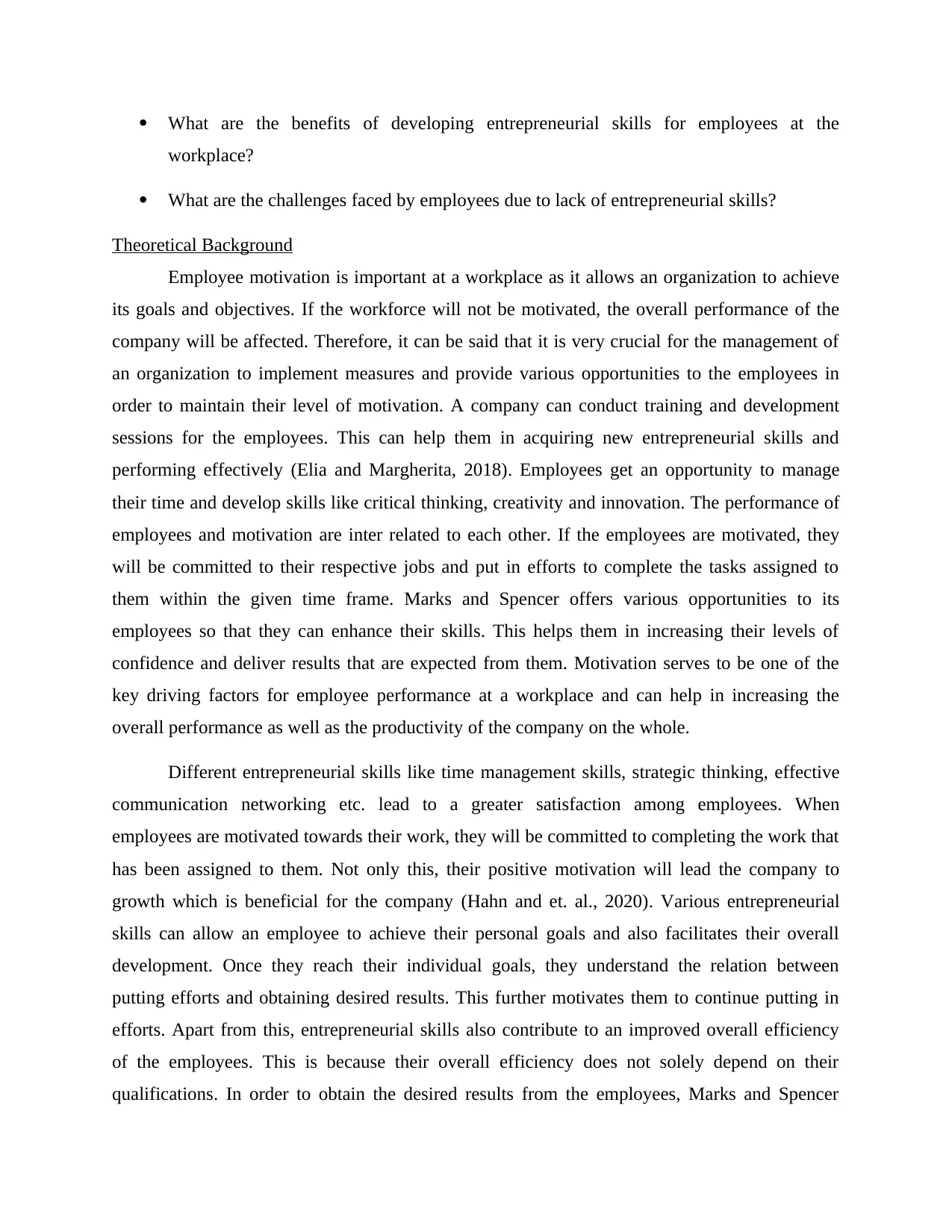
What are the benefits of developing entrepreneurial skills for employees at the
workplace?
What are the challenges faced by employees due to lack of entrepreneurial skills?
Theoretical Background
Employee motivation is important at a workplace as it allows an organization to achieve
its goals and objectives. If the workforce will not be motivated, the overall performance of the
company will be affected. Therefore, it can be said that it is very crucial for the management of
an organization to implement measures and provide various opportunities to the employees in
order to maintain their level of motivation. A company can conduct training and development
sessions for the employees. This can help them in acquiring new entrepreneurial skills and
performing effectively (Elia and Margherita, 2018). Employees get an opportunity to manage
their time and develop skills like critical thinking, creativity and innovation. The performance of
employees and motivation are inter related to each other. If the employees are motivated, they
will be committed to their respective jobs and put in efforts to complete the tasks assigned to
them within the given time frame. Marks and Spencer offers various opportunities to its
employees so that they can enhance their skills. This helps them in increasing their levels of
confidence and deliver results that are expected from them. Motivation serves to be one of the
key driving factors for employee performance at a workplace and can help in increasing the
overall performance as well as the productivity of the company on the whole.
Different entrepreneurial skills like time management skills, strategic thinking, effective
communication networking etc. lead to a greater satisfaction among employees. When
employees are motivated towards their work, they will be committed to completing the work that
has been assigned to them. Not only this, their positive motivation will lead the company to
growth which is beneficial for the company (Hahn and et. al., 2020). Various entrepreneurial
skills can allow an employee to achieve their personal goals and also facilitates their overall
development. Once they reach their individual goals, they understand the relation between
putting efforts and obtaining desired results. This further motivates them to continue putting in
efforts. Apart from this, entrepreneurial skills also contribute to an improved overall efficiency
of the employees. This is because their overall efficiency does not solely depend on their
qualifications. In order to obtain the desired results from the employees, Marks and Spencer
workplace?
What are the challenges faced by employees due to lack of entrepreneurial skills?
Theoretical Background
Employee motivation is important at a workplace as it allows an organization to achieve
its goals and objectives. If the workforce will not be motivated, the overall performance of the
company will be affected. Therefore, it can be said that it is very crucial for the management of
an organization to implement measures and provide various opportunities to the employees in
order to maintain their level of motivation. A company can conduct training and development
sessions for the employees. This can help them in acquiring new entrepreneurial skills and
performing effectively (Elia and Margherita, 2018). Employees get an opportunity to manage
their time and develop skills like critical thinking, creativity and innovation. The performance of
employees and motivation are inter related to each other. If the employees are motivated, they
will be committed to their respective jobs and put in efforts to complete the tasks assigned to
them within the given time frame. Marks and Spencer offers various opportunities to its
employees so that they can enhance their skills. This helps them in increasing their levels of
confidence and deliver results that are expected from them. Motivation serves to be one of the
key driving factors for employee performance at a workplace and can help in increasing the
overall performance as well as the productivity of the company on the whole.
Different entrepreneurial skills like time management skills, strategic thinking, effective
communication networking etc. lead to a greater satisfaction among employees. When
employees are motivated towards their work, they will be committed to completing the work that
has been assigned to them. Not only this, their positive motivation will lead the company to
growth which is beneficial for the company (Hahn and et. al., 2020). Various entrepreneurial
skills can allow an employee to achieve their personal goals and also facilitates their overall
development. Once they reach their individual goals, they understand the relation between
putting efforts and obtaining desired results. This further motivates them to continue putting in
efforts. Apart from this, entrepreneurial skills also contribute to an improved overall efficiency
of the employees. This is because their overall efficiency does not solely depend on their
qualifications. In order to obtain the desired results from the employees, Marks and Spencer
Paraphrase This Document
Need a fresh take? Get an instant paraphrase of this document with our AI Paraphraser
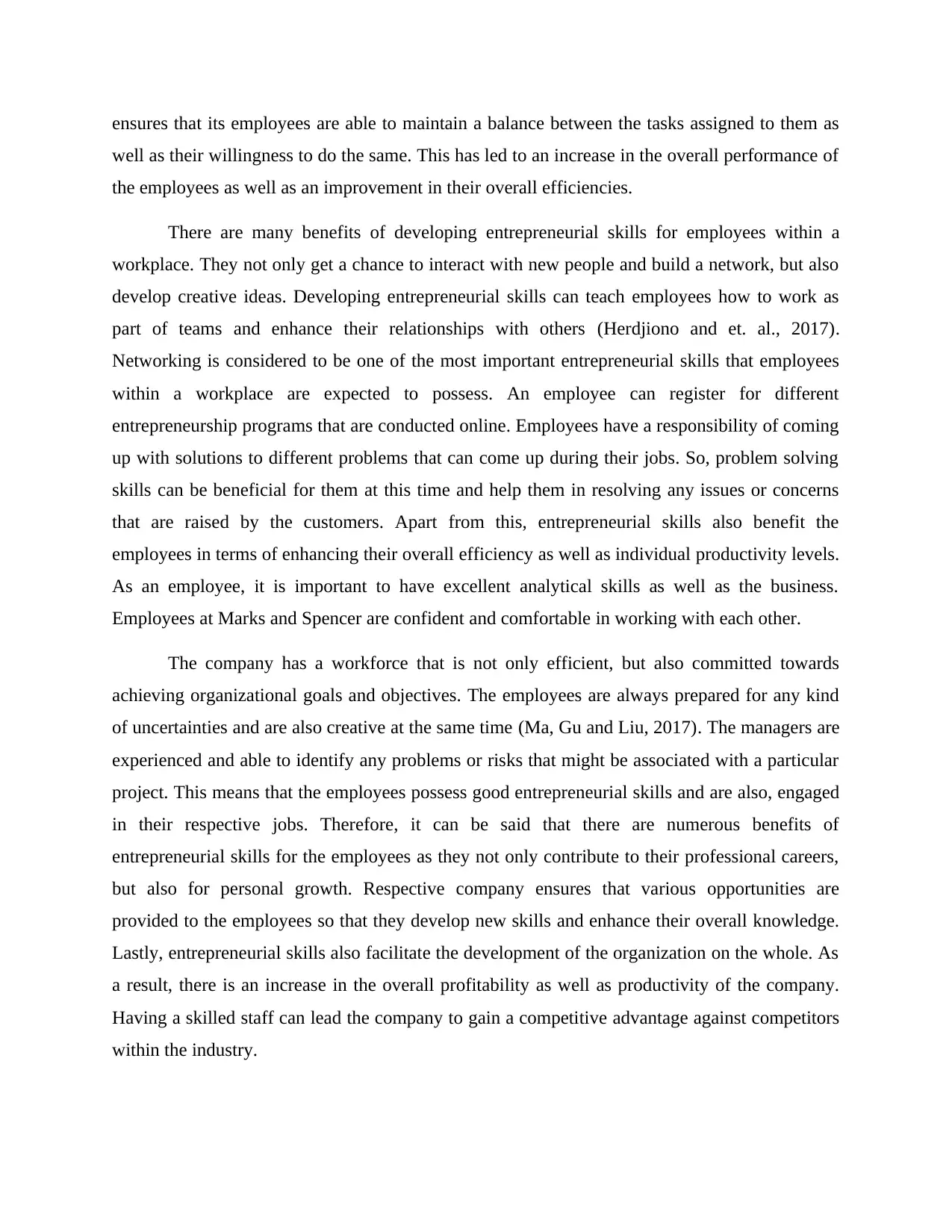
ensures that its employees are able to maintain a balance between the tasks assigned to them as
well as their willingness to do the same. This has led to an increase in the overall performance of
the employees as well as an improvement in their overall efficiencies.
There are many benefits of developing entrepreneurial skills for employees within a
workplace. They not only get a chance to interact with new people and build a network, but also
develop creative ideas. Developing entrepreneurial skills can teach employees how to work as
part of teams and enhance their relationships with others (Herdjiono and et. al., 2017).
Networking is considered to be one of the most important entrepreneurial skills that employees
within a workplace are expected to possess. An employee can register for different
entrepreneurship programs that are conducted online. Employees have a responsibility of coming
up with solutions to different problems that can come up during their jobs. So, problem solving
skills can be beneficial for them at this time and help them in resolving any issues or concerns
that are raised by the customers. Apart from this, entrepreneurial skills also benefit the
employees in terms of enhancing their overall efficiency as well as individual productivity levels.
As an employee, it is important to have excellent analytical skills as well as the business.
Employees at Marks and Spencer are confident and comfortable in working with each other.
The company has a workforce that is not only efficient, but also committed towards
achieving organizational goals and objectives. The employees are always prepared for any kind
of uncertainties and are also creative at the same time (Ma, Gu and Liu, 2017). The managers are
experienced and able to identify any problems or risks that might be associated with a particular
project. This means that the employees possess good entrepreneurial skills and are also, engaged
in their respective jobs. Therefore, it can be said that there are numerous benefits of
entrepreneurial skills for the employees as they not only contribute to their professional careers,
but also for personal growth. Respective company ensures that various opportunities are
provided to the employees so that they develop new skills and enhance their overall knowledge.
Lastly, entrepreneurial skills also facilitate the development of the organization on the whole. As
a result, there is an increase in the overall profitability as well as productivity of the company.
Having a skilled staff can lead the company to gain a competitive advantage against competitors
within the industry.
well as their willingness to do the same. This has led to an increase in the overall performance of
the employees as well as an improvement in their overall efficiencies.
There are many benefits of developing entrepreneurial skills for employees within a
workplace. They not only get a chance to interact with new people and build a network, but also
develop creative ideas. Developing entrepreneurial skills can teach employees how to work as
part of teams and enhance their relationships with others (Herdjiono and et. al., 2017).
Networking is considered to be one of the most important entrepreneurial skills that employees
within a workplace are expected to possess. An employee can register for different
entrepreneurship programs that are conducted online. Employees have a responsibility of coming
up with solutions to different problems that can come up during their jobs. So, problem solving
skills can be beneficial for them at this time and help them in resolving any issues or concerns
that are raised by the customers. Apart from this, entrepreneurial skills also benefit the
employees in terms of enhancing their overall efficiency as well as individual productivity levels.
As an employee, it is important to have excellent analytical skills as well as the business.
Employees at Marks and Spencer are confident and comfortable in working with each other.
The company has a workforce that is not only efficient, but also committed towards
achieving organizational goals and objectives. The employees are always prepared for any kind
of uncertainties and are also creative at the same time (Ma, Gu and Liu, 2017). The managers are
experienced and able to identify any problems or risks that might be associated with a particular
project. This means that the employees possess good entrepreneurial skills and are also, engaged
in their respective jobs. Therefore, it can be said that there are numerous benefits of
entrepreneurial skills for the employees as they not only contribute to their professional careers,
but also for personal growth. Respective company ensures that various opportunities are
provided to the employees so that they develop new skills and enhance their overall knowledge.
Lastly, entrepreneurial skills also facilitate the development of the organization on the whole. As
a result, there is an increase in the overall profitability as well as productivity of the company.
Having a skilled staff can lead the company to gain a competitive advantage against competitors
within the industry.
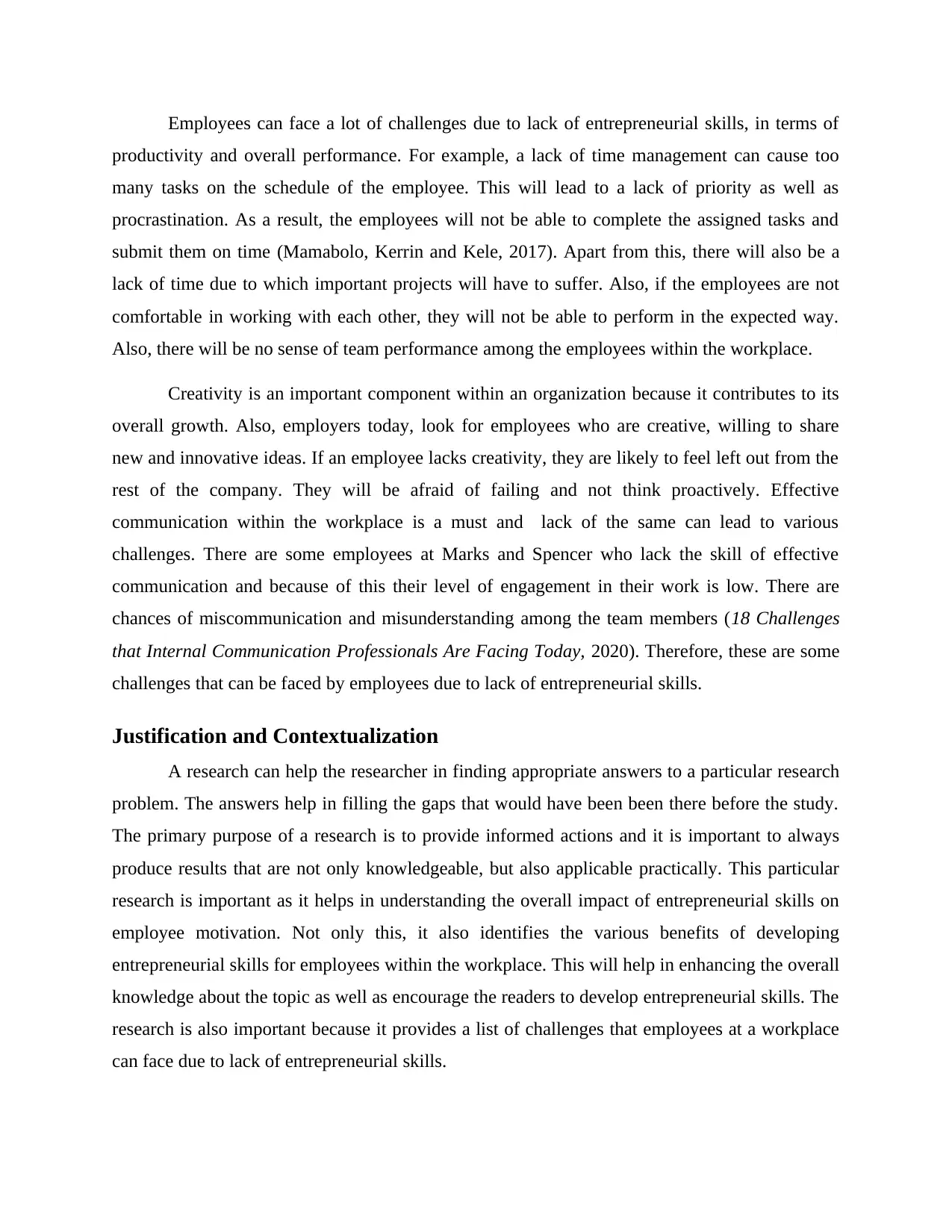
Employees can face a lot of challenges due to lack of entrepreneurial skills, in terms of
productivity and overall performance. For example, a lack of time management can cause too
many tasks on the schedule of the employee. This will lead to a lack of priority as well as
procrastination. As a result, the employees will not be able to complete the assigned tasks and
submit them on time (Mamabolo, Kerrin and Kele, 2017). Apart from this, there will also be a
lack of time due to which important projects will have to suffer. Also, if the employees are not
comfortable in working with each other, they will not be able to perform in the expected way.
Also, there will be no sense of team performance among the employees within the workplace.
Creativity is an important component within an organization because it contributes to its
overall growth. Also, employers today, look for employees who are creative, willing to share
new and innovative ideas. If an employee lacks creativity, they are likely to feel left out from the
rest of the company. They will be afraid of failing and not think proactively. Effective
communication within the workplace is a must and lack of the same can lead to various
challenges. There are some employees at Marks and Spencer who lack the skill of effective
communication and because of this their level of engagement in their work is low. There are
chances of miscommunication and misunderstanding among the team members (18 Challenges
that Internal Communication Professionals Are Facing Today, 2020). Therefore, these are some
challenges that can be faced by employees due to lack of entrepreneurial skills.
Justification and Contextualization
A research can help the researcher in finding appropriate answers to a particular research
problem. The answers help in filling the gaps that would have been been there before the study.
The primary purpose of a research is to provide informed actions and it is important to always
produce results that are not only knowledgeable, but also applicable practically. This particular
research is important as it helps in understanding the overall impact of entrepreneurial skills on
employee motivation. Not only this, it also identifies the various benefits of developing
entrepreneurial skills for employees within the workplace. This will help in enhancing the overall
knowledge about the topic as well as encourage the readers to develop entrepreneurial skills. The
research is also important because it provides a list of challenges that employees at a workplace
can face due to lack of entrepreneurial skills.
productivity and overall performance. For example, a lack of time management can cause too
many tasks on the schedule of the employee. This will lead to a lack of priority as well as
procrastination. As a result, the employees will not be able to complete the assigned tasks and
submit them on time (Mamabolo, Kerrin and Kele, 2017). Apart from this, there will also be a
lack of time due to which important projects will have to suffer. Also, if the employees are not
comfortable in working with each other, they will not be able to perform in the expected way.
Also, there will be no sense of team performance among the employees within the workplace.
Creativity is an important component within an organization because it contributes to its
overall growth. Also, employers today, look for employees who are creative, willing to share
new and innovative ideas. If an employee lacks creativity, they are likely to feel left out from the
rest of the company. They will be afraid of failing and not think proactively. Effective
communication within the workplace is a must and lack of the same can lead to various
challenges. There are some employees at Marks and Spencer who lack the skill of effective
communication and because of this their level of engagement in their work is low. There are
chances of miscommunication and misunderstanding among the team members (18 Challenges
that Internal Communication Professionals Are Facing Today, 2020). Therefore, these are some
challenges that can be faced by employees due to lack of entrepreneurial skills.
Justification and Contextualization
A research can help the researcher in finding appropriate answers to a particular research
problem. The answers help in filling the gaps that would have been been there before the study.
The primary purpose of a research is to provide informed actions and it is important to always
produce results that are not only knowledgeable, but also applicable practically. This particular
research is important as it helps in understanding the overall impact of entrepreneurial skills on
employee motivation. Not only this, it also identifies the various benefits of developing
entrepreneurial skills for employees within the workplace. This will help in enhancing the overall
knowledge about the topic as well as encourage the readers to develop entrepreneurial skills. The
research is also important because it provides a list of challenges that employees at a workplace
can face due to lack of entrepreneurial skills.
⊘ This is a preview!⊘
Do you want full access?
Subscribe today to unlock all pages.

Trusted by 1+ million students worldwide
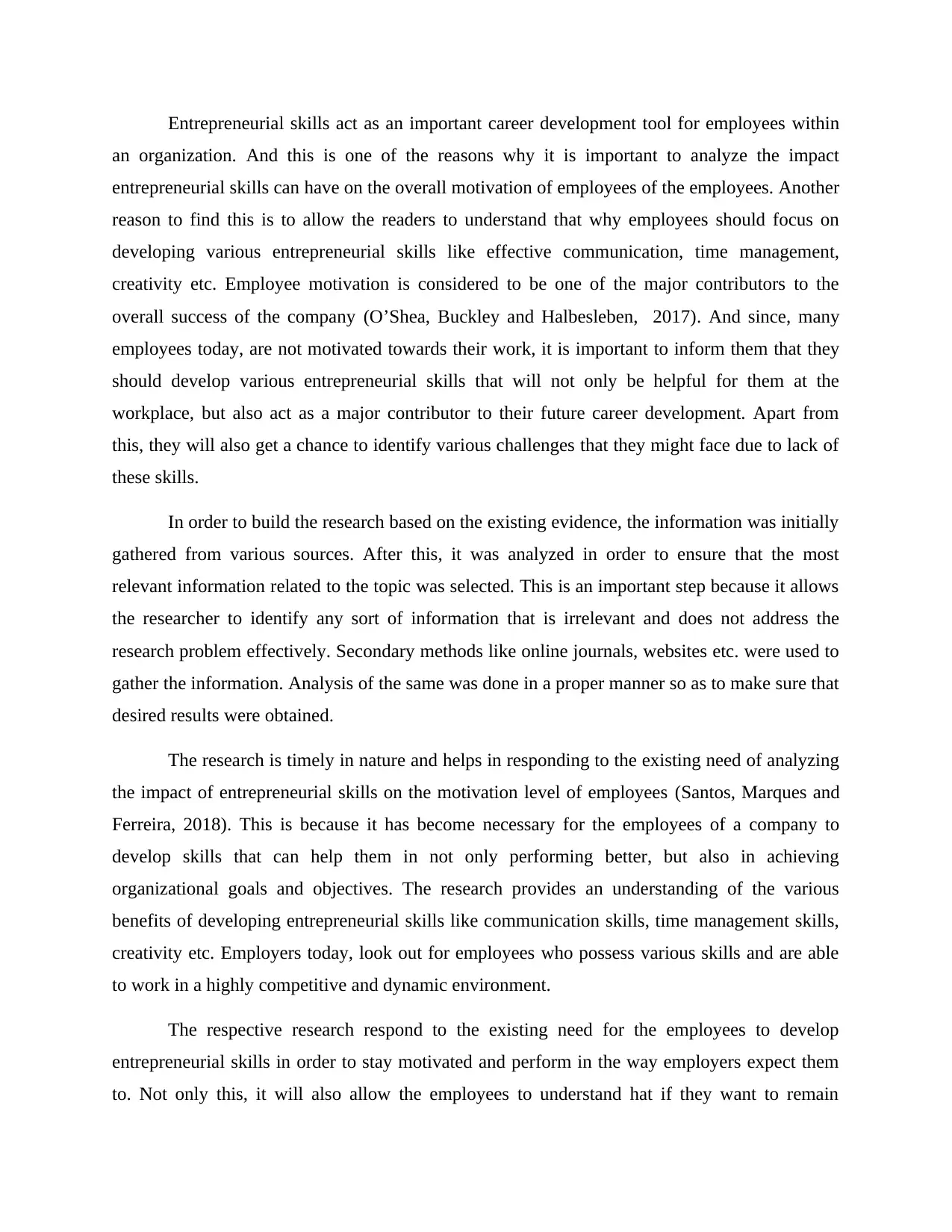
Entrepreneurial skills act as an important career development tool for employees within
an organization. And this is one of the reasons why it is important to analyze the impact
entrepreneurial skills can have on the overall motivation of employees of the employees. Another
reason to find this is to allow the readers to understand that why employees should focus on
developing various entrepreneurial skills like effective communication, time management,
creativity etc. Employee motivation is considered to be one of the major contributors to the
overall success of the company (O’Shea, Buckley and Halbesleben, 2017). And since, many
employees today, are not motivated towards their work, it is important to inform them that they
should develop various entrepreneurial skills that will not only be helpful for them at the
workplace, but also act as a major contributor to their future career development. Apart from
this, they will also get a chance to identify various challenges that they might face due to lack of
these skills.
In order to build the research based on the existing evidence, the information was initially
gathered from various sources. After this, it was analyzed in order to ensure that the most
relevant information related to the topic was selected. This is an important step because it allows
the researcher to identify any sort of information that is irrelevant and does not address the
research problem effectively. Secondary methods like online journals, websites etc. were used to
gather the information. Analysis of the same was done in a proper manner so as to make sure that
desired results were obtained.
The research is timely in nature and helps in responding to the existing need of analyzing
the impact of entrepreneurial skills on the motivation level of employees (Santos, Marques and
Ferreira, 2018). This is because it has become necessary for the employees of a company to
develop skills that can help them in not only performing better, but also in achieving
organizational goals and objectives. The research provides an understanding of the various
benefits of developing entrepreneurial skills like communication skills, time management skills,
creativity etc. Employers today, look out for employees who possess various skills and are able
to work in a highly competitive and dynamic environment.
The respective research respond to the existing need for the employees to develop
entrepreneurial skills in order to stay motivated and perform in the way employers expect them
to. Not only this, it will also allow the employees to understand hat if they want to remain
an organization. And this is one of the reasons why it is important to analyze the impact
entrepreneurial skills can have on the overall motivation of employees of the employees. Another
reason to find this is to allow the readers to understand that why employees should focus on
developing various entrepreneurial skills like effective communication, time management,
creativity etc. Employee motivation is considered to be one of the major contributors to the
overall success of the company (O’Shea, Buckley and Halbesleben, 2017). And since, many
employees today, are not motivated towards their work, it is important to inform them that they
should develop various entrepreneurial skills that will not only be helpful for them at the
workplace, but also act as a major contributor to their future career development. Apart from
this, they will also get a chance to identify various challenges that they might face due to lack of
these skills.
In order to build the research based on the existing evidence, the information was initially
gathered from various sources. After this, it was analyzed in order to ensure that the most
relevant information related to the topic was selected. This is an important step because it allows
the researcher to identify any sort of information that is irrelevant and does not address the
research problem effectively. Secondary methods like online journals, websites etc. were used to
gather the information. Analysis of the same was done in a proper manner so as to make sure that
desired results were obtained.
The research is timely in nature and helps in responding to the existing need of analyzing
the impact of entrepreneurial skills on the motivation level of employees (Santos, Marques and
Ferreira, 2018). This is because it has become necessary for the employees of a company to
develop skills that can help them in not only performing better, but also in achieving
organizational goals and objectives. The research provides an understanding of the various
benefits of developing entrepreneurial skills like communication skills, time management skills,
creativity etc. Employers today, look out for employees who possess various skills and are able
to work in a highly competitive and dynamic environment.
The respective research respond to the existing need for the employees to develop
entrepreneurial skills in order to stay motivated and perform in the way employers expect them
to. Not only this, it will also allow the employees to understand hat if they want to remain
Paraphrase This Document
Need a fresh take? Get an instant paraphrase of this document with our AI Paraphraser
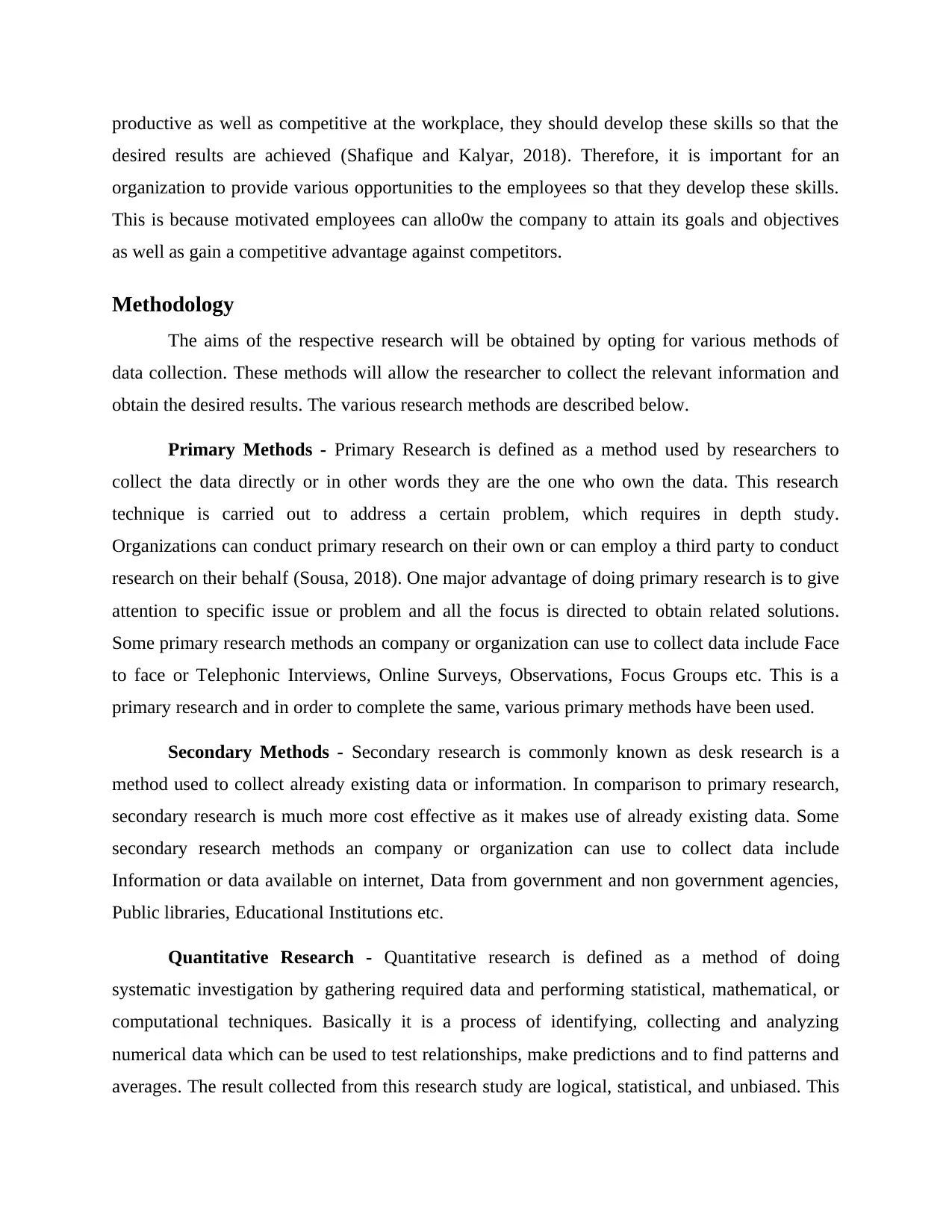
productive as well as competitive at the workplace, they should develop these skills so that the
desired results are achieved (Shafique and Kalyar, 2018). Therefore, it is important for an
organization to provide various opportunities to the employees so that they develop these skills.
This is because motivated employees can allo0w the company to attain its goals and objectives
as well as gain a competitive advantage against competitors.
Methodology
The aims of the respective research will be obtained by opting for various methods of
data collection. These methods will allow the researcher to collect the relevant information and
obtain the desired results. The various research methods are described below.
Primary Methods - Primary Research is defined as a method used by researchers to
collect the data directly or in other words they are the one who own the data. This research
technique is carried out to address a certain problem, which requires in depth study.
Organizations can conduct primary research on their own or can employ a third party to conduct
research on their behalf (Sousa, 2018). One major advantage of doing primary research is to give
attention to specific issue or problem and all the focus is directed to obtain related solutions.
Some primary research methods an company or organization can use to collect data include Face
to face or Telephonic Interviews, Online Surveys, Observations, Focus Groups etc. This is a
primary research and in order to complete the same, various primary methods have been used.
Secondary Methods - Secondary research is commonly known as desk research is a
method used to collect already existing data or information. In comparison to primary research,
secondary research is much more cost effective as it makes use of already existing data. Some
secondary research methods an company or organization can use to collect data include
Information or data available on internet, Data from government and non government agencies,
Public libraries, Educational Institutions etc.
Quantitative Research - Quantitative research is defined as a method of doing
systematic investigation by gathering required data and performing statistical, mathematical, or
computational techniques. Basically it is a process of identifying, collecting and analyzing
numerical data which can be used to test relationships, make predictions and to find patterns and
averages. The result collected from this research study are logical, statistical, and unbiased. This
desired results are achieved (Shafique and Kalyar, 2018). Therefore, it is important for an
organization to provide various opportunities to the employees so that they develop these skills.
This is because motivated employees can allo0w the company to attain its goals and objectives
as well as gain a competitive advantage against competitors.
Methodology
The aims of the respective research will be obtained by opting for various methods of
data collection. These methods will allow the researcher to collect the relevant information and
obtain the desired results. The various research methods are described below.
Primary Methods - Primary Research is defined as a method used by researchers to
collect the data directly or in other words they are the one who own the data. This research
technique is carried out to address a certain problem, which requires in depth study.
Organizations can conduct primary research on their own or can employ a third party to conduct
research on their behalf (Sousa, 2018). One major advantage of doing primary research is to give
attention to specific issue or problem and all the focus is directed to obtain related solutions.
Some primary research methods an company or organization can use to collect data include Face
to face or Telephonic Interviews, Online Surveys, Observations, Focus Groups etc. This is a
primary research and in order to complete the same, various primary methods have been used.
Secondary Methods - Secondary research is commonly known as desk research is a
method used to collect already existing data or information. In comparison to primary research,
secondary research is much more cost effective as it makes use of already existing data. Some
secondary research methods an company or organization can use to collect data include
Information or data available on internet, Data from government and non government agencies,
Public libraries, Educational Institutions etc.
Quantitative Research - Quantitative research is defined as a method of doing
systematic investigation by gathering required data and performing statistical, mathematical, or
computational techniques. Basically it is a process of identifying, collecting and analyzing
numerical data which can be used to test relationships, make predictions and to find patterns and
averages. The result collected from this research study are logical, statistical, and unbiased. This
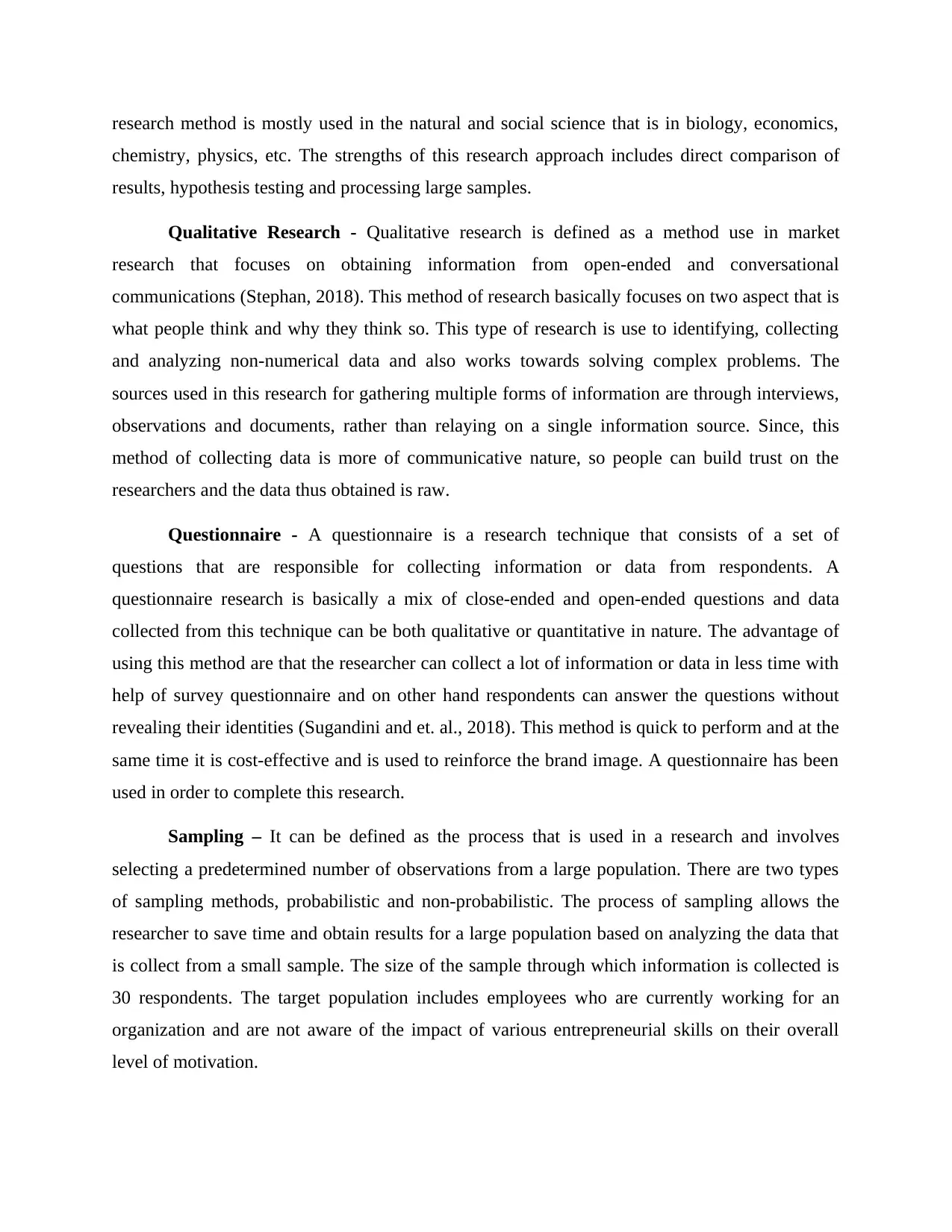
research method is mostly used in the natural and social science that is in biology, economics,
chemistry, physics, etc. The strengths of this research approach includes direct comparison of
results, hypothesis testing and processing large samples.
Qualitative Research - Qualitative research is defined as a method use in market
research that focuses on obtaining information from open-ended and conversational
communications (Stephan, 2018). This method of research basically focuses on two aspect that is
what people think and why they think so. This type of research is use to identifying, collecting
and analyzing non-numerical data and also works towards solving complex problems. The
sources used in this research for gathering multiple forms of information are through interviews,
observations and documents, rather than relaying on a single information source. Since, this
method of collecting data is more of communicative nature, so people can build trust on the
researchers and the data thus obtained is raw.
Questionnaire - A questionnaire is a research technique that consists of a set of
questions that are responsible for collecting information or data from respondents. A
questionnaire research is basically a mix of close-ended and open-ended questions and data
collected from this technique can be both qualitative or quantitative in nature. The advantage of
using this method are that the researcher can collect a lot of information or data in less time with
help of survey questionnaire and on other hand respondents can answer the questions without
revealing their identities (Sugandini and et. al., 2018). This method is quick to perform and at the
same time it is cost-effective and is used to reinforce the brand image. A questionnaire has been
used in order to complete this research.
Sampling – It can be defined as the process that is used in a research and involves
selecting a predetermined number of observations from a large population. There are two types
of sampling methods, probabilistic and non-probabilistic. The process of sampling allows the
researcher to save time and obtain results for a large population based on analyzing the data that
is collect from a small sample. The size of the sample through which information is collected is
30 respondents. The target population includes employees who are currently working for an
organization and are not aware of the impact of various entrepreneurial skills on their overall
level of motivation.
chemistry, physics, etc. The strengths of this research approach includes direct comparison of
results, hypothesis testing and processing large samples.
Qualitative Research - Qualitative research is defined as a method use in market
research that focuses on obtaining information from open-ended and conversational
communications (Stephan, 2018). This method of research basically focuses on two aspect that is
what people think and why they think so. This type of research is use to identifying, collecting
and analyzing non-numerical data and also works towards solving complex problems. The
sources used in this research for gathering multiple forms of information are through interviews,
observations and documents, rather than relaying on a single information source. Since, this
method of collecting data is more of communicative nature, so people can build trust on the
researchers and the data thus obtained is raw.
Questionnaire - A questionnaire is a research technique that consists of a set of
questions that are responsible for collecting information or data from respondents. A
questionnaire research is basically a mix of close-ended and open-ended questions and data
collected from this technique can be both qualitative or quantitative in nature. The advantage of
using this method are that the researcher can collect a lot of information or data in less time with
help of survey questionnaire and on other hand respondents can answer the questions without
revealing their identities (Sugandini and et. al., 2018). This method is quick to perform and at the
same time it is cost-effective and is used to reinforce the brand image. A questionnaire has been
used in order to complete this research.
Sampling – It can be defined as the process that is used in a research and involves
selecting a predetermined number of observations from a large population. There are two types
of sampling methods, probabilistic and non-probabilistic. The process of sampling allows the
researcher to save time and obtain results for a large population based on analyzing the data that
is collect from a small sample. The size of the sample through which information is collected is
30 respondents. The target population includes employees who are currently working for an
organization and are not aware of the impact of various entrepreneurial skills on their overall
level of motivation.
⊘ This is a preview!⊘
Do you want full access?
Subscribe today to unlock all pages.

Trusted by 1+ million students worldwide
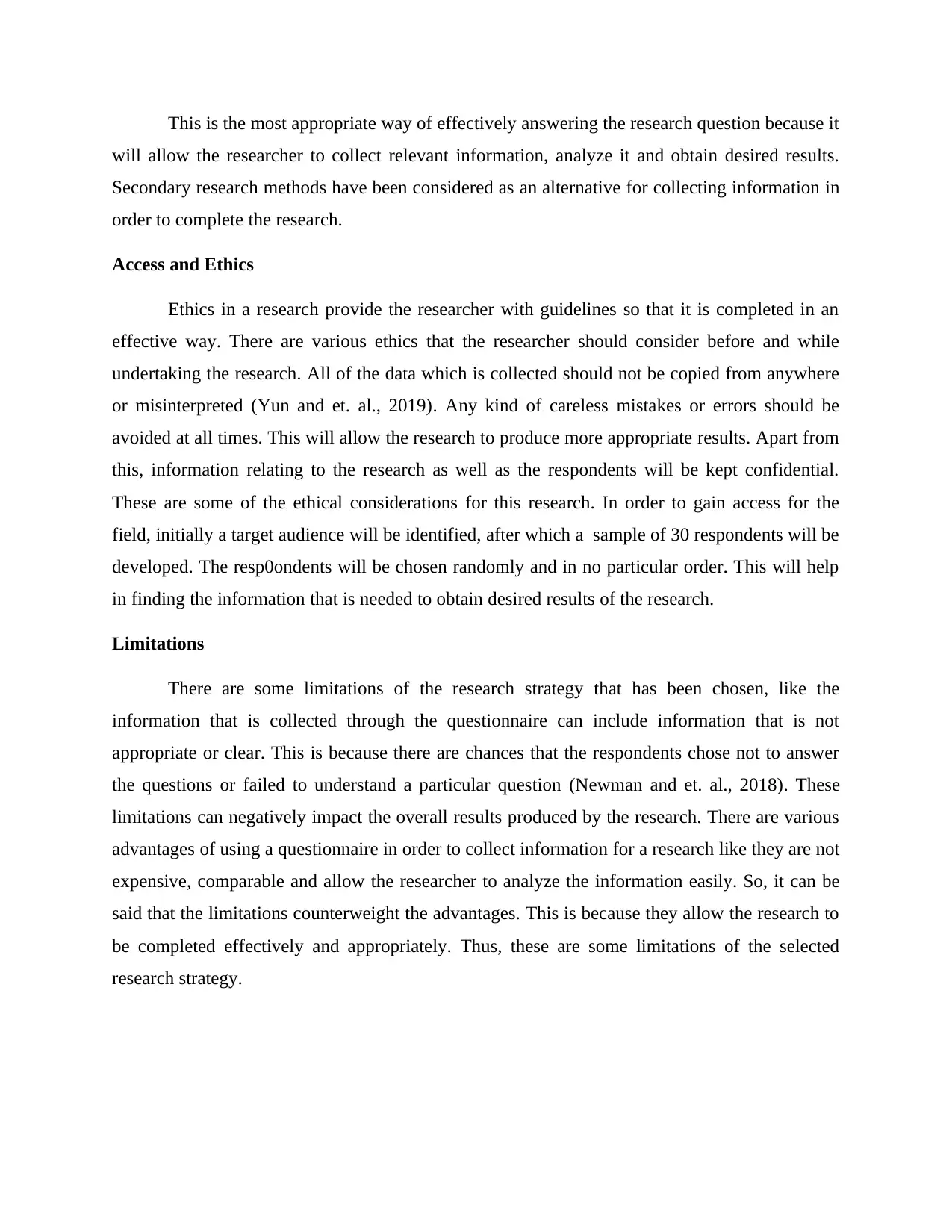
This is the most appropriate way of effectively answering the research question because it
will allow the researcher to collect relevant information, analyze it and obtain desired results.
Secondary research methods have been considered as an alternative for collecting information in
order to complete the research.
Access and Ethics
Ethics in a research provide the researcher with guidelines so that it is completed in an
effective way. There are various ethics that the researcher should consider before and while
undertaking the research. All of the data which is collected should not be copied from anywhere
or misinterpreted (Yun and et. al., 2019). Any kind of careless mistakes or errors should be
avoided at all times. This will allow the research to produce more appropriate results. Apart from
this, information relating to the research as well as the respondents will be kept confidential.
These are some of the ethical considerations for this research. In order to gain access for the
field, initially a target audience will be identified, after which a sample of 30 respondents will be
developed. The resp0ondents will be chosen randomly and in no particular order. This will help
in finding the information that is needed to obtain desired results of the research.
Limitations
There are some limitations of the research strategy that has been chosen, like the
information that is collected through the questionnaire can include information that is not
appropriate or clear. This is because there are chances that the respondents chose not to answer
the questions or failed to understand a particular question (Newman and et. al., 2018). These
limitations can negatively impact the overall results produced by the research. There are various
advantages of using a questionnaire in order to collect information for a research like they are not
expensive, comparable and allow the researcher to analyze the information easily. So, it can be
said that the limitations counterweight the advantages. This is because they allow the research to
be completed effectively and appropriately. Thus, these are some limitations of the selected
research strategy.
will allow the researcher to collect relevant information, analyze it and obtain desired results.
Secondary research methods have been considered as an alternative for collecting information in
order to complete the research.
Access and Ethics
Ethics in a research provide the researcher with guidelines so that it is completed in an
effective way. There are various ethics that the researcher should consider before and while
undertaking the research. All of the data which is collected should not be copied from anywhere
or misinterpreted (Yun and et. al., 2019). Any kind of careless mistakes or errors should be
avoided at all times. This will allow the research to produce more appropriate results. Apart from
this, information relating to the research as well as the respondents will be kept confidential.
These are some of the ethical considerations for this research. In order to gain access for the
field, initially a target audience will be identified, after which a sample of 30 respondents will be
developed. The resp0ondents will be chosen randomly and in no particular order. This will help
in finding the information that is needed to obtain desired results of the research.
Limitations
There are some limitations of the research strategy that has been chosen, like the
information that is collected through the questionnaire can include information that is not
appropriate or clear. This is because there are chances that the respondents chose not to answer
the questions or failed to understand a particular question (Newman and et. al., 2018). These
limitations can negatively impact the overall results produced by the research. There are various
advantages of using a questionnaire in order to collect information for a research like they are not
expensive, comparable and allow the researcher to analyze the information easily. So, it can be
said that the limitations counterweight the advantages. This is because they allow the research to
be completed effectively and appropriately. Thus, these are some limitations of the selected
research strategy.
Paraphrase This Document
Need a fresh take? Get an instant paraphrase of this document with our AI Paraphraser
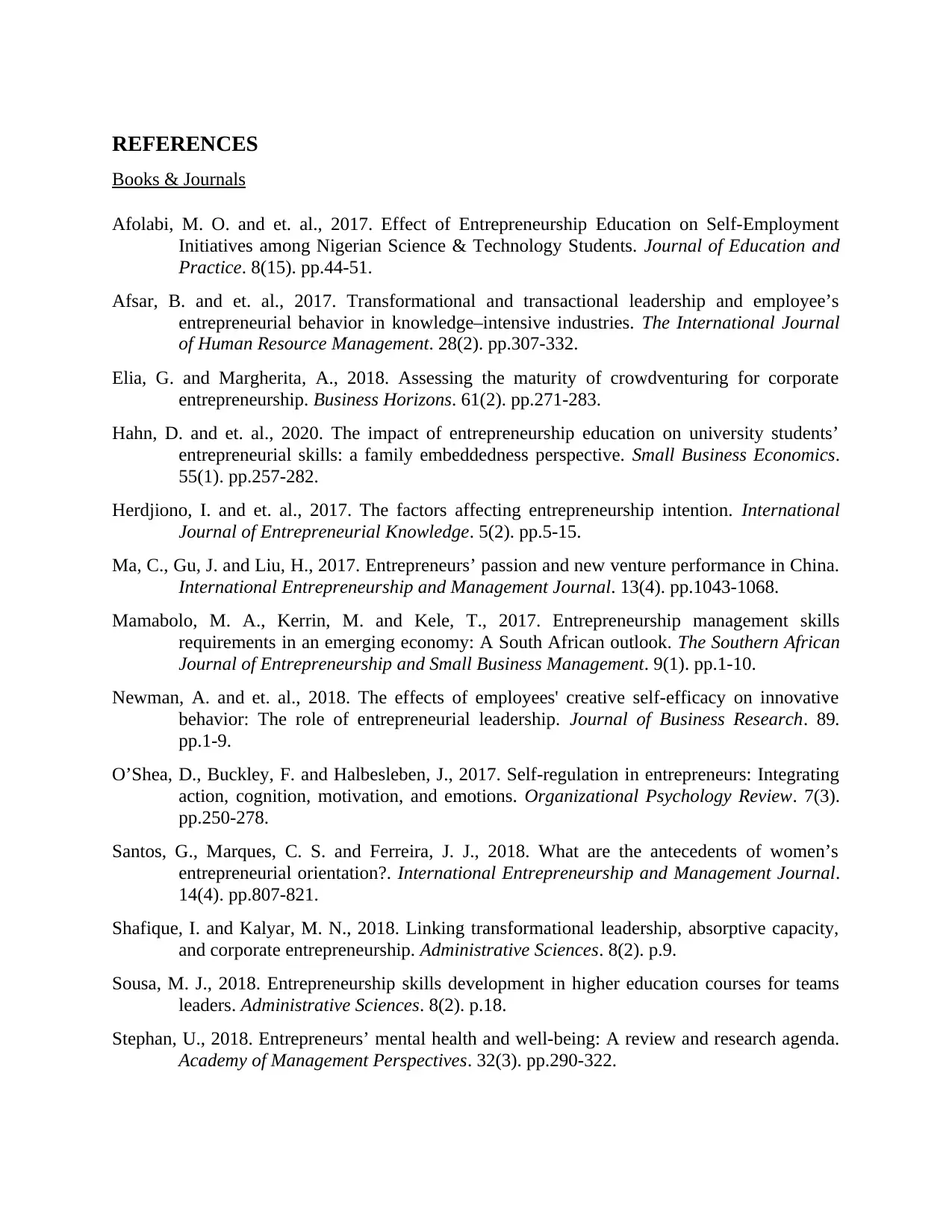
REFERENCES
Books & Journals
Afolabi, M. O. and et. al., 2017. Effect of Entrepreneurship Education on Self-Employment
Initiatives among Nigerian Science & Technology Students. Journal of Education and
Practice. 8(15). pp.44-51.
Afsar, B. and et. al., 2017. Transformational and transactional leadership and employee’s
entrepreneurial behavior in knowledge–intensive industries. The International Journal
of Human Resource Management. 28(2). pp.307-332.
Elia, G. and Margherita, A., 2018. Assessing the maturity of crowdventuring for corporate
entrepreneurship. Business Horizons. 61(2). pp.271-283.
Hahn, D. and et. al., 2020. The impact of entrepreneurship education on university students’
entrepreneurial skills: a family embeddedness perspective. Small Business Economics.
55(1). pp.257-282.
Herdjiono, I. and et. al., 2017. The factors affecting entrepreneurship intention. International
Journal of Entrepreneurial Knowledge. 5(2). pp.5-15.
Ma, C., Gu, J. and Liu, H., 2017. Entrepreneurs’ passion and new venture performance in China.
International Entrepreneurship and Management Journal. 13(4). pp.1043-1068.
Mamabolo, M. A., Kerrin, M. and Kele, T., 2017. Entrepreneurship management skills
requirements in an emerging economy: A South African outlook. The Southern African
Journal of Entrepreneurship and Small Business Management. 9(1). pp.1-10.
Newman, A. and et. al., 2018. The effects of employees' creative self-efficacy on innovative
behavior: The role of entrepreneurial leadership. Journal of Business Research. 89.
pp.1-9.
O’Shea, D., Buckley, F. and Halbesleben, J., 2017. Self-regulation in entrepreneurs: Integrating
action, cognition, motivation, and emotions. Organizational Psychology Review. 7(3).
pp.250-278.
Santos, G., Marques, C. S. and Ferreira, J. J., 2018. What are the antecedents of women’s
entrepreneurial orientation?. International Entrepreneurship and Management Journal.
14(4). pp.807-821.
Shafique, I. and Kalyar, M. N., 2018. Linking transformational leadership, absorptive capacity,
and corporate entrepreneurship. Administrative Sciences. 8(2). p.9.
Sousa, M. J., 2018. Entrepreneurship skills development in higher education courses for teams
leaders. Administrative Sciences. 8(2). p.18.
Stephan, U., 2018. Entrepreneurs’ mental health and well-being: A review and research agenda.
Academy of Management Perspectives. 32(3). pp.290-322.
Books & Journals
Afolabi, M. O. and et. al., 2017. Effect of Entrepreneurship Education on Self-Employment
Initiatives among Nigerian Science & Technology Students. Journal of Education and
Practice. 8(15). pp.44-51.
Afsar, B. and et. al., 2017. Transformational and transactional leadership and employee’s
entrepreneurial behavior in knowledge–intensive industries. The International Journal
of Human Resource Management. 28(2). pp.307-332.
Elia, G. and Margherita, A., 2018. Assessing the maturity of crowdventuring for corporate
entrepreneurship. Business Horizons. 61(2). pp.271-283.
Hahn, D. and et. al., 2020. The impact of entrepreneurship education on university students’
entrepreneurial skills: a family embeddedness perspective. Small Business Economics.
55(1). pp.257-282.
Herdjiono, I. and et. al., 2017. The factors affecting entrepreneurship intention. International
Journal of Entrepreneurial Knowledge. 5(2). pp.5-15.
Ma, C., Gu, J. and Liu, H., 2017. Entrepreneurs’ passion and new venture performance in China.
International Entrepreneurship and Management Journal. 13(4). pp.1043-1068.
Mamabolo, M. A., Kerrin, M. and Kele, T., 2017. Entrepreneurship management skills
requirements in an emerging economy: A South African outlook. The Southern African
Journal of Entrepreneurship and Small Business Management. 9(1). pp.1-10.
Newman, A. and et. al., 2018. The effects of employees' creative self-efficacy on innovative
behavior: The role of entrepreneurial leadership. Journal of Business Research. 89.
pp.1-9.
O’Shea, D., Buckley, F. and Halbesleben, J., 2017. Self-regulation in entrepreneurs: Integrating
action, cognition, motivation, and emotions. Organizational Psychology Review. 7(3).
pp.250-278.
Santos, G., Marques, C. S. and Ferreira, J. J., 2018. What are the antecedents of women’s
entrepreneurial orientation?. International Entrepreneurship and Management Journal.
14(4). pp.807-821.
Shafique, I. and Kalyar, M. N., 2018. Linking transformational leadership, absorptive capacity,
and corporate entrepreneurship. Administrative Sciences. 8(2). p.9.
Sousa, M. J., 2018. Entrepreneurship skills development in higher education courses for teams
leaders. Administrative Sciences. 8(2). p.18.
Stephan, U., 2018. Entrepreneurs’ mental health and well-being: A review and research agenda.
Academy of Management Perspectives. 32(3). pp.290-322.
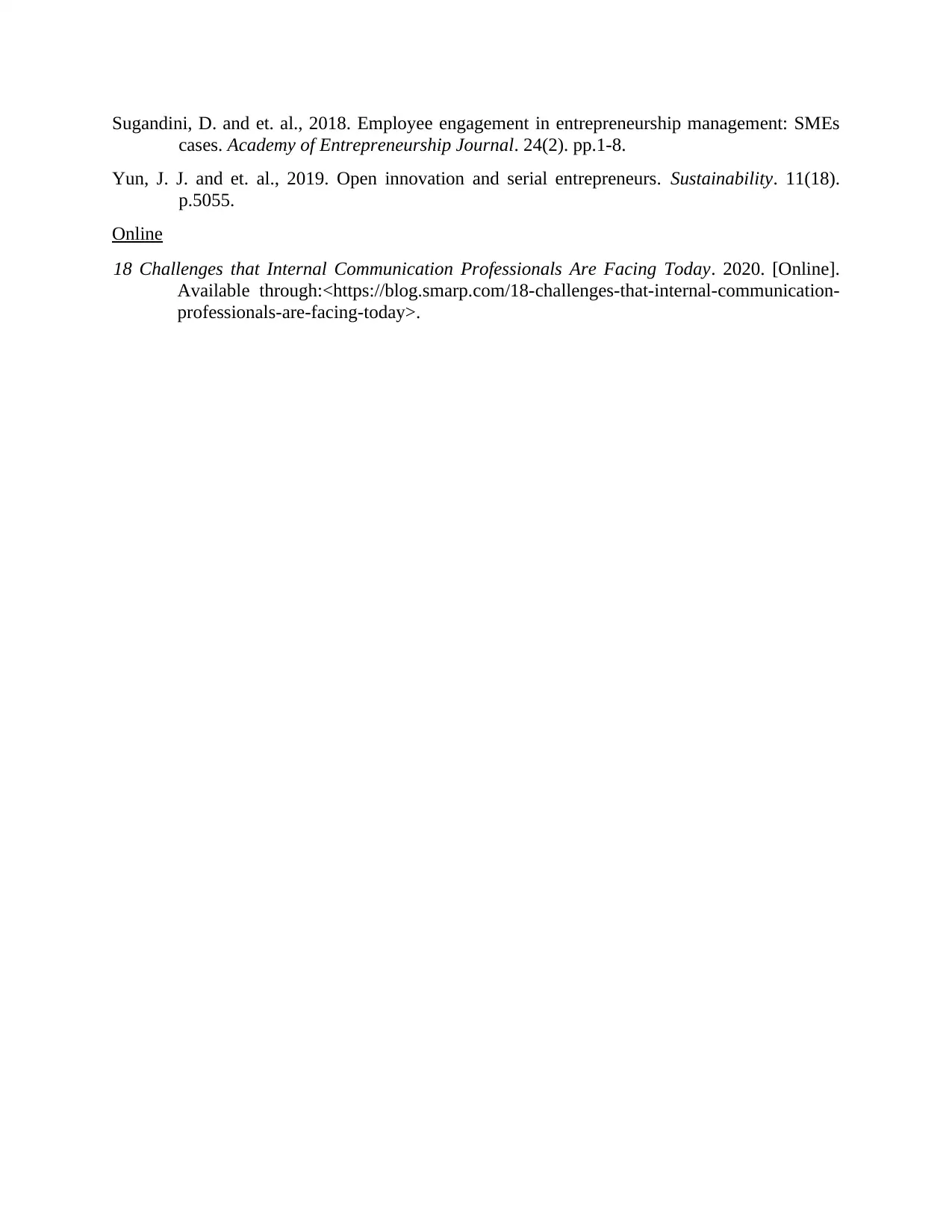
Sugandini, D. and et. al., 2018. Employee engagement in entrepreneurship management: SMEs
cases. Academy of Entrepreneurship Journal. 24(2). pp.1-8.
Yun, J. J. and et. al., 2019. Open innovation and serial entrepreneurs. Sustainability. 11(18).
p.5055.
Online
18 Challenges that Internal Communication Professionals Are Facing Today. 2020. [Online].
Available through:<https://blog.smarp.com/18-challenges-that-internal-communication-
professionals-are-facing-today>.
cases. Academy of Entrepreneurship Journal. 24(2). pp.1-8.
Yun, J. J. and et. al., 2019. Open innovation and serial entrepreneurs. Sustainability. 11(18).
p.5055.
Online
18 Challenges that Internal Communication Professionals Are Facing Today. 2020. [Online].
Available through:<https://blog.smarp.com/18-challenges-that-internal-communication-
professionals-are-facing-today>.
⊘ This is a preview!⊘
Do you want full access?
Subscribe today to unlock all pages.

Trusted by 1+ million students worldwide
1 out of 12
Related Documents
Your All-in-One AI-Powered Toolkit for Academic Success.
+13062052269
info@desklib.com
Available 24*7 on WhatsApp / Email
![[object Object]](/_next/static/media/star-bottom.7253800d.svg)
Unlock your academic potential
Copyright © 2020–2025 A2Z Services. All Rights Reserved. Developed and managed by ZUCOL.




